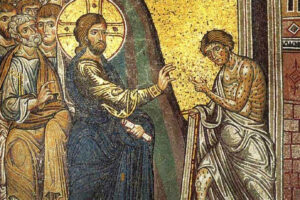Last edited on 3/Mar/2021
Introduction
Now Thomas, one of the Twelve, called the Twin, was not with them when Jesus came. 25 So the other disciples told him, “We have seen the Lord.” But he said to them, “Unless I see in his hands the mark of the nails, and place my finger into the mark of the nails, and place my hand into his side, I will never believe.
26 Eight days later, his disciples were inside again, and Thomas was with them. Although the doors were locked, Jesus came and stood among them and said, “Peace be with you.” 27 Then he said to Thomas, “Put your finger here, and see my hands; and put out your hand, and place it in my side. Do not disbelieve, but believe.” 28 Thomas answered him, “My Lord and my God!” 29 Jesus said to him, “Have you believed because you have seen me? Blessed are those who have not seen and yet have believed. (John 20:24–29, ESVUK)
On the first of April, 2018, millions of Christians around the world celebrated Easter, the holy day of the year that marks Jesus’ resurrection from the dead, by which he proved that he is the Messiah, and the only way to salvation. In this passage we see that Thomas was at first very sceptical towards Jesus’ resurrection, and refused to trust the disciples’ testimony. He boldly asserted that unless he sees and touches the marks in Jesus’ hands from the nails, and places his hand in his side, he will never believe. As of yet, Thomas had not received the Holy Spirit; his heart and mind were still closed by sin.
Jesus Appeared to Thomas
But Jesus was not finished with him yet, just like how today he still worked in many of us, who were persistent in sin or disbelief. One week later, to his astonishment, Jesus actually appeared to Thomas in spite of his disbelief, and answered his exact demands, inviting him to touch the marks on his hands and his side, to prove that he was not just hallucinating, or seeing Jesus’ “spirit” rather than his actual body. Besides seeing Jesus alive again, there are at least three reasons for Thomas feeling astonished here:
- Even when Jesus was not in the room with them, he knew exactly what Thomas had said to the disciples. By answering Thomas’ demands that were made in private, Jesus proved that he is omniscient (all-knowing). The disciples realised that there is nothing that escapes his knowledge, and that his understanding is infinite.
- In John 2:19–22, Jesus said to the unbelieving Jews “Destroy this temple, and in three days I will raise it up”. John then specified that he was speaking about the temple of his body, and that when the disciples saw Jesus raised from the dead, they remembered this. When anyone dies, they are powerless to do anything, let alone raise themselves. But when Jesus died, he was able to raise himself because he is all-powerful (omnipotent). The disciples came to this realisation when they saw Jesus risen from the dead.
- Before Thomas and the other disciples saw Jesus raised, they did not understand the Scriptures that taught he must rise from the dead (John 20:8–9). Resurrections had happened before, such as when Elisha raised the Shunammite woman’s son (2 Kings 4:32–37), or when Jesus raised Lazarus (John 11:41–44), but Jesus’ resurrection was special in that it was the final Messianic prophecy that he fulfilled. Thus, when the disciples finally understood the Scriptures, they realised that he really is the Christ who came to save the world.
Thomas Confessed Jesus As His Lord and God
All of this culminated in Thomas’ profound confession, proclaiming Jesus as his Lord and his God (John 20:28). This was definitely a fitting occasion to confess Jesus as God, since in this one act he exhibited two of God’s infinite attributes of omniscience and omnipotence, as well as a third divine attribute, the ability to grant eternal salvation, because he fulfilled the final Messianic prophecy. As Lord, Jesus is the Master and Leader of our lives. As God, Jesus is the eternal, sovereign Creator who gave us life (John 1:1–3). There is not a shadow of doubt that here the Bible teaches the deity of Christ, and all who deceitfully assert otherwise are ignoring the clear and plain words of the passage.
The Disciples Really Did See Jesus
Thomas, once a strong sceptic of the resurrection of Christ, became a powerful witness to it after seeing Jesus and his hands and side for himself. If Thomas and the disciples really had not seen Jesus risen from the dead and knew it was a lie, they would not have endured prison (Acts 5:17), beatings, torture (Acts 5:40–41), afflictions, calamities, riots, labours, sleepless nights, hunger (2 Corinthians 6:3–5), and later death (John 21:17–19; Acts 7:54–60, 12:1–3; 2 Corinthians 4:8–12) for confessing and teaching this.
Jesus’ Response to Thomas
Jesus then answered Thomas “Have you believed because you have seen me?” as if to say “O you of little faith!” Even if Thomas never got to see the resurrection himself, he still should have trusted in the disciples’ testimony, because Jesus himself predicted his suffering, death, and resurrection before they went into Jerusalem for the last time (Luke 18:31–34). The lesson here is that even if God’s Word might challenge us, we must never subject it to our logic and reason. Instead, we should completely trust it, because God’s ways are higher than ours, and he knows more than we do.
God calls into existence things that do not yet exist (Romans 4:17). Are miracles really too hard for him? We should trust Jesus’ words when he said that “With man this is impossible, but with God all things are possible” (Matthew 19:26). He then moves on to say “Blessed are those who have not seen and yet have believed.”
Jesus’ Words Speak Clearly to Us Today
This is a truly comforting statement for those of us who are Christians. 2,000 years ago Jesus ascended into Heaven, and we can no longer see him, hear him, or question him. The eyewitnesses of Jesus’ resurrection have also perished long ago, and we can no longer interview them on the details of what they saw and experienced. Yet, in spite of this, and the world’s opposition, we still believe in his resurrection based upon the testimony of the Bible.
When Jesus ascended into Heaven, he did not leave us alone. In fact, Jesus said “it is to your advantage that I go away, for if I do not go away, the Helper will not come to you. But if I go, I will send him to you” (John 16:7). The reason why we believe in the Bible’s testimony concerning the resurrection of Jesus without seeing him, is because we have the Holy Spirit living within us, who bears witness to Jesus (John 15:26), and created faith in our hearts (1 Corinthians 12:3). He converted us through the gospel (1 Thessalonians 1:5), came upon us in holy baptism (Acts 2:38–39), and continues to nourish our faith through the Word and the Eucharist (Romans 10:17; Matthew 26:26–28). He is a living witness to Jesus Christ’s resurrection for all generations.
You Do Not Need to See Jesus to Be a True Christian
Furthermore, Jesus’ words assure us that we do not have to have some subjective experience, dream, or vision of Jesus, in order to be true Christians. To the contrary, he assures us that we are true Christians because we trust in his Word, the Bible, because of the Holy Spirit who lives within us. What God has said remains true, no matter what we say, think, or feel. The author of Hebrews supports Jesus’ teaching by saying that faith “is the assurance of things hoped for, the conviction of things not seen” (Hebrews 11:1).
We do not have to see Jesus to know that he was raised from the dead, because we believe that his testimony, the testimony of his apostles, and all the other many witnesses who saw him, were absolutely truthful and reliable. God has graciously inspired the authors of Scripture to write the Bible so that we could be certain of the most important things he chose to make known to us. Our experiences outside of the Bible can be helpful, but they do not determine truth.
Conclusion
No doubt echoing Jesus’ words here, Peter wrote in his letter to the elect exiles in the dispersion: “Though you have not seen him, you love him. Though you do not now see him, you believe in him and rejoice with joy that is inexpressible and filled with glory” (1 Peter 1:8). We have not seen Jesus, but we love him because we know that he fully paid the penalty of our sins by dying on the cross (Colossians 2:13–14), and has saved us from eternal condemnation, even though we did not deserve it (John 3:16–18; Romans 5:6–8).
We do not see him now, but we rejoice with inexpressible joy because we know that just as Jesus was raised from the dead by the glory of the Father, we who have been baptised into Christ’s death will also be raised in the same way to newness of life, to be with him in eternal paradise (Romans 6:3–5). Although we long to see Jesus face to face, we can rejoice in the meantime, knowing that according to the Saviour, we who believe in his resurrection from the dead are blessed. If we keep the faith to the very end, we will meet the Lord Jesus on the last day and be with him forever (1 Thessalonians 4:16–17). Thanks be to God. Amen.






